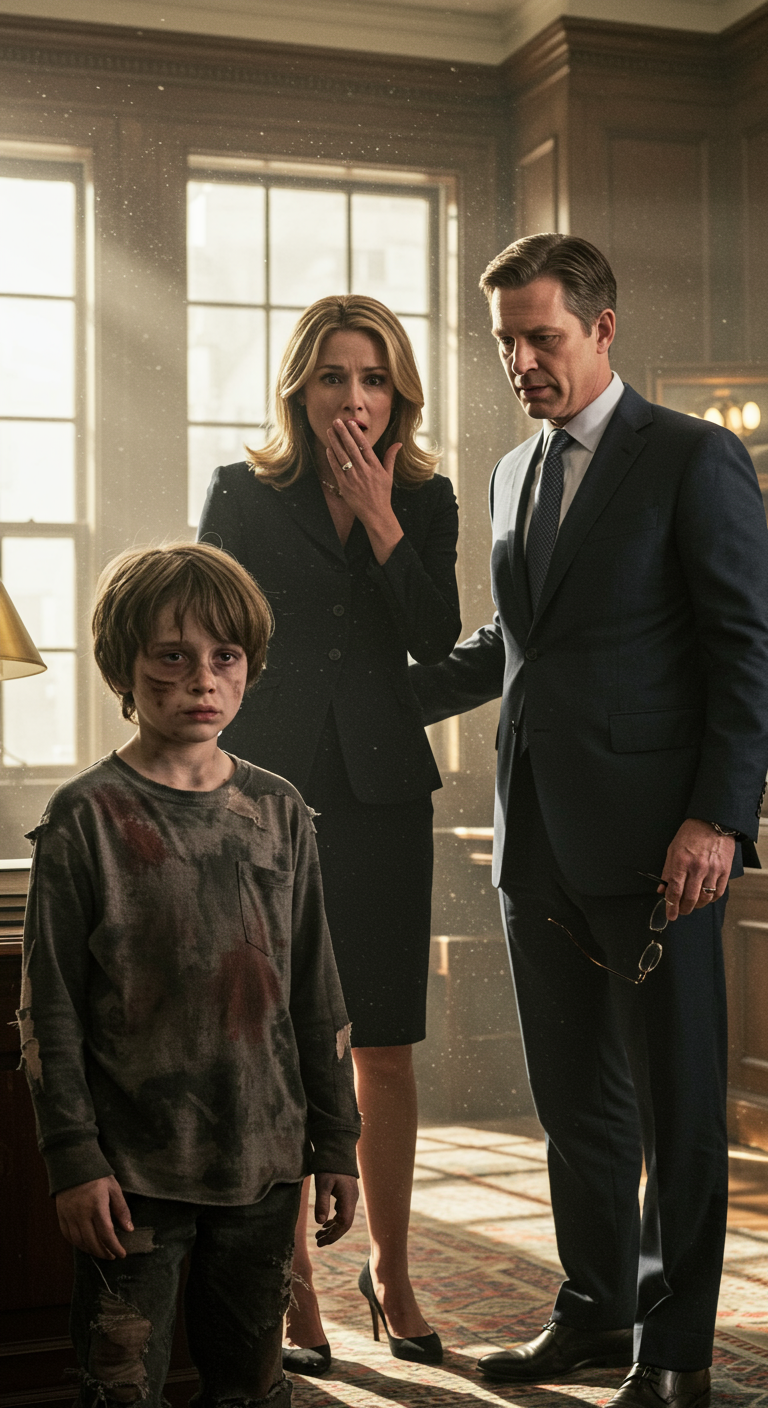In the heart of a bustling city, where luxury and destitution collide on every street corner, a chance encounter between a wealthy couple and a homeless child would unravel a story of deception, heartbreak, and ultimately, redemption.
What began as a simple test of honesty soon exposed a web of lies stretching back a decade—revealing that the line between privilege and poverty is often drawn by the cruelties of fate, and sometimes, by family itself.
A Millionaire’s Bet
Andrew Mitchell, a prominent attorney and philanthropist, is known for his generosity as much as his wealth. On a recent afternoon, Mitchell and his wife, Emily, stopped outside a luxury boutique.
As Emily admired her latest handbag acquisition, she noticed a frail boy sitting on a piece of cardboard at the edge of the sidewalk. His clothes were dirty, his face obscured by oversized sunglasses, and his hand stretched out in silent plea to passersby.
Emily’s reaction was one of discomfort and skepticism. “Are you seriously going to keep handing out money to these people?” she challenged her husband, after he gave a $100 bill to a homeless man earlier that day. “They’re on the streets because they choose to be.”
Mitchell disagreed. “No one chooses this life,” he replied. But Emily, unmoved, proposed a wager: Andrew would drop his wallet, stuffed with $1,000 in cash but no identification, near the boy. If the child returned it, Emily would reward him—and never again question her husband’s charitable impulses. If not, Andrew would stop giving cash to strangers.
The Test
Andrew agreed, confident in the honesty of those society often overlooks. He executed the plan, dropping his wallet near the boy as Emily secretly filmed the scene. The child, later identified as Ethan, quickly picked up the wallet and, after feeling the thick wad of bills, discreetly pocketed it.
Emily’s triumph was immediate. “See? He stole it. There’s no such thing as an honest beggar,” she declared, showing Andrew the footage. Disappointed but unwilling to make a scene, Andrew insisted the boy keep the money, rationalizing that perhaps he needed it more.
What neither Andrew nor Emily realized was that this “test” had set in motion events that would shake the very foundation of their family.

The Boy’s Story
Ethan’s life was a study in survival. Blind from birth, he was abandoned as an infant and raised by a succession of homeless caretakers, each lost to the relentless hardships of street life. Despite years of rejection and hunger, Ethan clung to a simple code: never take what isn’t yours.
After discovering the wallet contained no identification but a business card for Andrew’s law office, Ethan resolved to return it. His journey to the firm was fraught with obstacles. Security guards nearly threw him out, breaking his glasses in the process, until Andrew and Emily intervened.
Face to face, Ethan handed over the wallet, every bill untouched. “I just wanted to return it,” he said, refusing any reward but asking for a meal and a new pair of glasses.
Emily’s demeanor shifted. For the first time, she saw the child not as a threat, but as a person in need. She bought him new clothes, arranged for a bath, and took him to lunch. Andrew and Emily found themselves moved by the boy’s story and his resilience.
A Family Secret Unraveled
The story might have ended there, with a charitable act and a changed heart. But as Ethan settled into the Mitchells’ home, Emily’s mother, Margaret, was struck by a chilling realization. The boy’s eyes—cloudy, white with congenital cataracts—matched those of the baby Emily had lost ten years prior.
Margaret was haunted by memories of that night. Faced with a blind grandchild, she had bribed a corrupt doctor to declare the child dead and abandoned the infant in a dumpster, determined to protect her daughter’s future and reputation.
Unable to shake the resemblance, Margaret secretly obtained a lock of Ethan’s hair and paid for a DNA test. The results confirmed her worst fears: Ethan was indeed Emily and Andrew’s biological son.
The Poisoned Legacy
Margaret’s reaction was not one of remorse, but panic. Fearing exposure and the loss of her influence over the family, she hatched a desperate plan. At a celebratory dinner, she prepared a dessert laced with cyanide, intending it for Ethan. But fate intervened: the cups were accidentally rearranged, and Margaret herself consumed the poisoned mousse.
Her death was sudden and dramatic, sparking a police investigation that quickly uncovered the presence of cyanide. It was Emily, sorting through her mother’s belongings, who found the damning evidence—a jar of poison, the DNA results, and a diary confessing to the entire plot.
Emily was devastated. “My mother was a monster,” she sobbed to Andrew, as the full horror of the past came to light.
Redemption and Reunion
With the truth revealed, Andrew and Emily embraced Ethan as their son, determined to make up for lost time. They arranged for surgery to treat his blindness, paid for by Andrew’s firm. The procedure was a success; Ethan regained partial sight, seeing his parents’ faces for the first time.
The Mitchells formally adopted Ethan, and Emily, seeking to atone for her mother’s cruelty, founded a nonprofit to aid homeless children. Ethan thrived, becoming a role model for his younger siblings and a symbol of hope for others forced to live on the streets.
A City’s Reckoning
The story of the Mitchells and Ethan has sparked a wider conversation about the treatment of homeless children and the responsibilities of those with power and privilege. “There are good people everywhere,” Emily now says. “We just have to be willing to see them.”
City officials have acknowledged the need for stronger support systems and more compassionate outreach. Advocates point to Ethan’s journey as proof that one act of kindness can change the trajectory of a life—and perhaps, a family.
